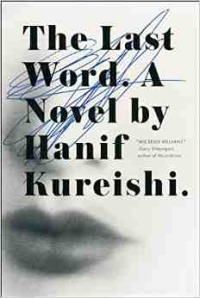The Last Word by Hanif Kureishi
 Wednesday, April 1, 2015 at 10:15AM
Wednesday, April 1, 2015 at 10:15AM 
Published in Great Britain in 2014; published by Scribner on March 10, 2015
Witty observations about human nature are Hanif Kureishi's specialty. In The Last Word, he turns his attention to the dying craft of writing literature at a time when there are "more writers than readers. ... The only books people read were diet books, cookbooks, or exercise books. People didn't want to improve the world, they only wanted better bodies." There isn't much of a story in The Last Word, but Kureishi improves the world by adding a few laughs. While there is more wit than substance in The Last Word, I found the novel worth reading for its ample supply of amusing sentences.
Harry Johnson has been commissioned to write a biography of Mamoon Azam. Mamoon, one of the first dark-skinned Indians to make a splash in the literary world, is Rushdie-like in his stature and opinions. The publisher envisions a controversial biography with a "hot, moody photo" of Mamoon on the cover that will stimulate sales of his books -- "long family novels set in colonial India" -- which are critically acclaimed but mostly ignored by a general reading public that views them as too intellectual.
Mamoon's current wife, Liana Luccioni, insists that the biography must not damage Mamoon's reputation, exactly the opposite of the book Harry's publisher wants him to write. To an extent, The Last Word is a biting commentary on celebrity biographies, which dish dirt to titillate rather than illuminate. Contrary to Liana's belief that readers want "upliftment, to learn the path of greatness so they can follow down it," Harry's publisher believes that readers want icons to be trashed so they can consider themselves the icon's equal.
Mamoon, on the other hand, has no desire to be peeled "as you would an onion." Serious writers are out of fashion, says Mamoon. Now, "no sooner has someone been sodomized by a close relative than they think they can write a memoir." Although Harry believes readers will understand that "sexuality makes fools of everyone," Mamoon resists being made fashionable through the exposure of a past that (if the gossip is to be believed) was exciting and provocative if selfish and cruel. While Mamoon accuses biographers of envying the sex lives of the subjects they trash, he also denies that his life was filled with sexual escapades ("even Philip Larkin had more sex"). Mamoon does, however, appreciate the idea of biography as fiction, since fiction often yields truths that haphazard reality cannot so easily convey.
Although written as a comedy, The Last Word contains some serious thoughts. It is ultimately a novel about the meaning and making of art. Should art stand alone, divorced from its context or creator, freed from "banal and simplistic correlations" between art and the artist's experiences? Is art merely a seduction? To be taken seriously, must artists display passion by crossing boundaries that are denied to most of us? The notion of how love should fit into one's life provides a related theme (for what is love if not art?) that becomes more prominent toward the novel's end. The novel has broad elements of a love story but doesn't try to be one (or perhaps it tries and fails). The assessment of a life in the final years (art as the continuous rewriting of memory) also gives Kureishi a chance to express serious thoughts about reflection and atonement. Still, The Last Word is too fluffy to be regarded as a serious novel.
I suspect that many readers will dislike the novel because they dislike nearly every character but, in a comedy that exposes the weaknesses and foibles of the human spirit, likability seems unimportant. The Last Word is not a long novel but it suffers from a surprising amount of redundancy. Some of that results from seeing Mamoon through various eyes but some of it is repetition that serves no apparent end. To the extent that there is a plot involving Harry and the various women in his life, it's silly and insubstantial. To the extent that the plot focuses on a writer writing about a writer, the story's best moment is a clever plot twist near the end. The Last Word is not as profound as Kureishi wanted it to be, but it gave me enough chuckles to be satisfying.
RECOMMENDED
Reader Comments